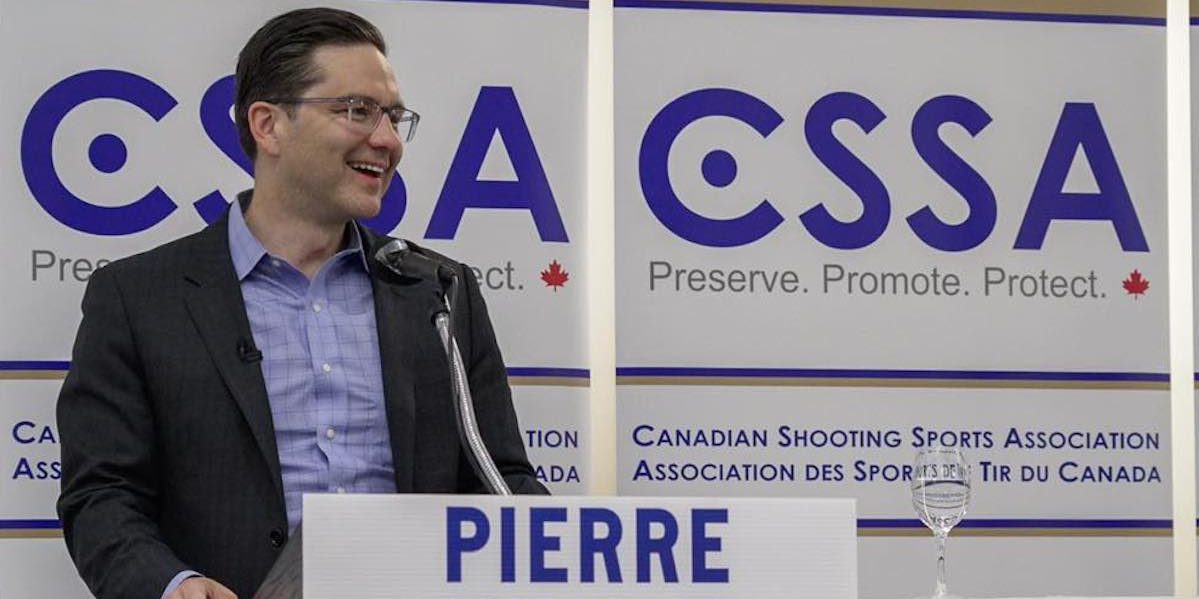Federal Conservative leadership candidate Pierre Poilievre seems to have generated a lot of publicity for himself lately with a much re-tweeted pledge to force Canadian universities to “protect free speech” by withholding federal research grants and other funds from post-secondary institutions that won’t knuckle under to his demands.
Naturally, as one would expect from a politician like Poilievre, this recycled Trump Administration executive order doesn’t mean what it purports to say.
At the political level, Pollievre’s threat is an effective dog-whistle – a message intended to shore up the support of the Conservative Party of Canada’s far-right base while fooling the rest of us.
What it actually means, if I may be so bold as to translate the apparent Conservative frontrunner’s language for him, is this: “Your federal government will guarantee the presence of offensive anti-abortion campaigners and potentially violent anti-vaccine thugs on campus. Or else.”
The Conservative Party’s hard-right base gets the message. The rest of us are intended to miss it, and to ask, “Well, who doesn’t support free speech?”
If freedom of expression were the real concern, of course, no action would be required. Notwithstanding the Notwithstanding Clause, the Canadian Charter of Rights and Freedoms has been reasonably effective up to now protecting Canadians’ fundamental right to free expression.
Of course, Section 1 of the Charter qualifies that by stating the rights guaranteed in the Constitution are “subject only to such reasonable limits prescribed by law as can be demonstrably justified in a free and democratic society.”
With or without such language, however, that caveat must always exist in a democracy’s constitution, tacitly if not explicitly, to protect us from those who would hold cities hostage or cry fire in a crowded theatre, as Justice Oliver Wendell Holmes Jr. of the United States Supreme Court famously explained back in 1919.
On a policy level, it seems likely this means Poilievre would like to compel institutional speech – never mind that compelling speech, just like shutting it down, is a violation of the guarantee of free expression set out in the Charter.
Whether such a policy would actually result in funding cuts is, of course, another matter entirely.
That would be quite complicated, and subject to enough legal action to keep many lawyers well paid and happy for many months. Moreover, the legislation would have to be competently drafted and rigorously abided by – neither a strong suit of CPC governments in the recent past, as former prime minister Stephen Harper’s lack of success on the pipeline file clearly illustrates.
As suggested by former U.S. president Donald Trump’s “free speech” grandstanding in 2019, in the short term the political utility of the dog-whistle tends to outweigh the practical application of the rule, such as it may be. As we have learned in the past week, though, longer term such demands can be a real indicator of risk to our rights as citizens.
Nothing about this is unusual or unexpected, of course. “Defending free speech” in places like universities where right-wing ideas may not be particularly popular – because, for example, they mean interfering with the free-speech rights of others – is standard operating procedure for privileged and powerful politicians looking for the opportunity to shout down anyone who disagrees with them.
Consider the “Chicago Principles,” foisted on Alberta’s universities by Jason Kenney’s United Conservative Party in the soon-to-depart premier’s salad days of political power three years ago.
The manifesto was adopted by the University of Chicago in 2014 to push back against popular opposition to racist speakers on campus, university prohibitions of racist, sexist and homophobic attacks on students, and calls to change the names of buildings and remove statues celebrating historic figures known for their racism or cruelty.
To implement the policy, the university hired the Foundation for Individual Rights in Education, an organization that journalist and Yale University political science lecturer Jim Sleeper said “purports to protect ‘free speech’ on college campuses, but expends more energy blaming – and chilling – ‘politically correct’ activists and administrators.”
The language of the Chicago statement, calling for “free, robust, and uninhibited debate and deliberation,” strives to sound as inspiring as that of the United States Constitution. Like the U.S. Constitution, which was written to ensure human slavery would be an enduring institution, it is deceptive, intended to enshrine bullying by privileging certain ideas and groups while marginalizing others.
The statement and its supporters make a straw man of safe spaces where marginalized student groups can gather free from harassment by people who dislike or disagree with them. But the goal is to create a safe space for only one set of ideas, the economic nostrums and social conservative rigidities of the increasingly radicalized North American right.
Naturally, with his fetishizing of John A. Macdonald’s premiership and his friendship with “residential” school apologists and deniers, not to mention his strong anti-abortion views, this was a natural bandwagon for Kenney to jump aboard.
Never mind Kenney’s decree as federal immigration minister in 2009 banning George Galloway from Canada on the spurious grounds the left-wing British Parliamentarian was a threat to national security. The real problem, of course, was that Kenney didn’t agree with Mr. Galloway’s opinions about the rights of the Palestinian people.
It can’t have been by mere coincidence, this was happening when Mr. Kenney was about to launch his abortive attempt to harass and silence anyone who dared to criticize Alberta’s fossil fuel industry with the so-called Energy War Room, or Canadian Energy Centre.
We’ve heard very little about the Chicago Principles since then, however, doubtless because it was an exercise in performative politics, not a sincere effort to protect free speech, which appears to be in no danger in Alberta as long as the flags and bumper stickers say “F**k Trudeau” and not “F**k Harper.”




